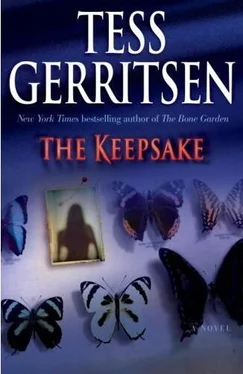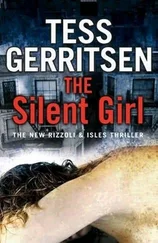She gathered together the notes and envelopes addressed to Josephine Sommer and ripped them up, wishing that at the same time she could rip away the part of her life she’d been trying all these years to forget. Somehow it had caught up with her, and no matter how hard she tried to outrun it, it would always be part of who she was. She brought the shredded bits of paper into the bathroom and flushed them down the toilet.
She had to leave Boston.
Now was the logical time to get out of town. The police knew she was frightened by what had happened today, so her departure would rouse no suspicions. Perhaps later, they might ask questions, search records, but for now they had no reason to examine her past. They would assume she was who she said she was: Josephine Pulcillo, who lived quietly and modestly, who’d worked her way through college and grad school while waitressing at the Blue Star cocktail lounge. All of that was true. All of that would check out fine. As long as they didn’t dig deeper or earlier, as long as she gave them no reason to, she would never trip any alarms. She could slip away from Boston with no one the wiser.
But I don’t want to leave Boston.
She stared out the window at a neighborhood she’d grown attached to. Rain clouds had given way to splashes of sunshine, and the sidewalks sparkled, fresh and clean. When she’d arrived to take the job, it had been March and she’d been a stranger to these streets. She’d trudged through the icy wind, thinking that she wouldn’t last long here, believing that, like her mother, she was a warm-weather creature, bred for desert heat, not a New England winter. But one April day after the snow had melted, she’d walked through the Boston Common, past budding trees and the golden blush of daffodils, and she’d suddenly realized she belonged here. That in this city where every brick and stone seemed to resonate with the echoes of history, she felt at home. She’d walked the cobblestones of Beacon Hill and could almost hear the clatter of horses’ hooves and carriage wheels. She’d stood on the pier at Long Wharf and imagined the call of the fishmongers, the laughter of seamen. Like her mother, she had always been more interested in the past than in the present, and in this city, history still breathed.
Now I’ll have to leave it. And leave behind this name, as well.
The apartment buzzer startled her. She crossed to the intercom, pausing to calm her voice before she pressed the speaker button. “Yes?”
“Josie, it’s Nicholas. Can I come up?”
She could think of no way to gracefully decline his visit, so she buzzed him in. A moment later he was at her door, his hair sparkling with rain, his gray eyes pinched with worry behind drizzle-fogged glasses.
“Are you all right? We heard what happened.”
“How did you find out?”
“We were waiting for you to come into work. Then Detective Crowe told us there’d been some trouble. That someone broke into your car.”
“It’s a lot worse than that,” she said, and sank down wearily on the couch. He stood watching her, and for the first time his gaze made her uneasy; he was studying her far too closely. Suddenly she felt as exposed as Madam X, her protective wrappings stripped away to reveal the ugly reality underneath.
“Someone had my keys, Nick.”
“The ones you misplaced?”
“They weren’t misplaced. They were stolen.”
“You mean-on purpose?”
“Theft usually is.” She saw his perplexed expression and thought: Poor Nick. You’ve been trapped too long with your musty antiquities. You have no idea how ugly the real world is. “It probably happened while I was at work.”
“Oh dear.”
“The museum keys weren’t on the ring, so you don’t have to worry about the building. The collection’s safe.”
“I’m not worried about the collection. I’m worried about you. ” He took in a deep breath, like a swimmer about to plunge deep underwater. “If you don’t feel safe here, Josephine, you could always…” Suddenly he straightened and boldly announced: “I have a spare bedroom in my house. You’re absolutely welcome to stay with me.”
She smiled. “Thank you. But I’m going to leave town for a while, so I won’t be coming in to work for a few weeks. I’m sorry to leave you in the lurch, especially now.”
“Where are you going?”
“It seems like a good time to visit my aunt. I haven’t seen her in a year.” She went to the window, where she looked out at a view that she would miss. “Thank you for everything, Nicholas,” she said. Thank you for being the closest thing to a friend I’ve had in years.
“What’s really going on?” he asked. He came up behind her, close enough to touch her, yet he didn’t. He merely stood there, a quiet presence patiently hovering nearby, as he always did. “You can trust me, you know. No matter what.”
Suddenly she wanted to tell him the truth, tell him everything about her past. But she did not want to witness his reaction. He had believed in the bland fiction known as Josephine Pulcillo. He had always been kind to her, and the best way for her to repay that kindness was to maintain the illusion and not disappoint him.
“Josephine? What happened today?” he asked.
“You’ll probably see it on the news tonight,” she said. “Someone used my keys to get into my car. To leave something in my trunk.”
“What did they leave?”
She turned and faced him. “Another Madam X.”
Josephine awakened to the glare of the late-afternoon sun in her eyes. Squinting through the window of the Greyhound bus, she saw rolling green fields cloaked in the golden haze of sunset. Last night she had scarcely slept, and only after boarding the bus that morning had she finally nodded off from sheer exhaustion. Now she had no idea where she was, but judging by the time they must be close to the Massachusetts-New York State border. Had she been driving her own car, the entire journey would take only six hours. By bus, with transfers in Albany and Syracuse and Binghamton, the journey would take all day.
When they finally pulled into her last transfer stop in Binghamton, it was dark. Once again she dragged herself off the bus and made her way to a pay phone. Cell phone calls could be traced, and she’d left hers turned off since leaving Boston. Instead she reached into her pocket for quarters and deposited coins into the hungry phone. The same answering machine message greeted her, delivered in a brisk female voice.
“I’m probably out digging. Leave a number and I’ll call you back.”
Josephine hung up without saying a word. Then she hauled her two suitcases to the next bus and joined the short line of passengers waiting to board. No one spoke; they all seemed as drained as she was, and resigned to the next stage of their journey.
At elevenPM, the bus pulled into the village of Waverly.
She was the only passenger to step off, and she found herself standing alone in front of a dark mini-mart. Even a village this small had to have a taxi service. She headed toward a phone booth and was about to deposit quarters when she saw theOUT OF SERVICE note taped across the coin slot. It was the final blow at the end of an exhausting day. Staring at that useless pay phone, she suddenly laughed: a raw, desperate sound that echoed across the empty parking lot. If she couldn’t get a cab, she faced a five-mile hike in the dark, hauling two suitcases.
She weighed the risks of turning on her cell phone. Use it even once, and she could be tracked here. But I’m so tired, she thought, and I don’t know what else to do, or where else to go. I’m stranded in a small town and the only person I know here seems to be unreachable.
Headlights appeared on the road.
Читать дальше












